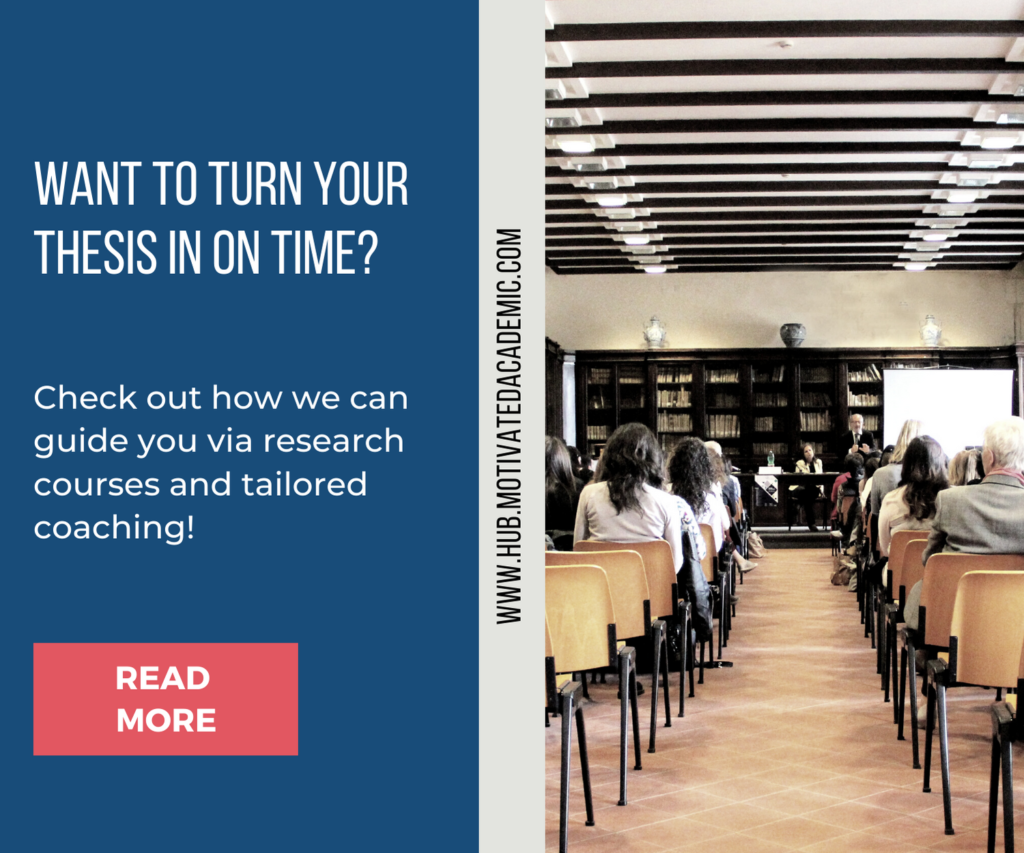Table of Contents
Trying to decide whether to do a PhD or not? It’s a tough one we get that! That’s why we share the key reasons why to get a PhD and whether PhD matters!

Considering doing a PhD? Do you know why you want to be a PhD student? Do you need a PhD degree to be successful in your career? These may be the questions that go through your mind as a prospective PhD student.
Unless you’re committed to working in higher education or research, a PhD may not be something that you need to succeed. Therefore, it’s important to answer yourself question whether you need to do a PhD in the first place. If you need it, you need to answer yourself – WHY why do you wish to pursue PhD in the first place. It is also crucial to think about what to do after a PhD degree.
Why it’s so important to know your WHY? Well, as you may know, each PhD program takes a quite significant amount of time and lots of hard work. Getting a doctoral degree is exciting, stimulating, yet one of the most time-consuming endeavours in one’s life. That’s why you need to know why do you want to do a PhD degree. What’s the good reason for you to do a PhD?
And why do people actually decide to undertake a PhD program, regardless of the requirements? Well, there are many good reasons why someone actually does a PhD degree. From advancing knowledge, personal ambition, change career direction, future career prospects and job market requirements and so on. But I did want to say that no reason is better than another. At the end of the day, what matters is that happy with your decision to do a PhD. It may give you a purpose, make your life better, and by extension, make other lives better. That’s a wonderful place to be.
Why did I decide to do a PhD degree?
Why did I decide to enrol for a PhD program? That’s a very good question! And let me answer that very quickly before I’ll talk about the good reasons why you can do a PhD degree.
What did I want to achieve in my career? At the very beginning, I didn’t consider actually doing a PhD degree. It wasn’t on my agenda. As an engineer at that time, I just wanted to make a positive change in our society. I wanted to contribute towards solving global challenges. I wanted to contribute to solving climate change.
I knew that global warming was an issue and I knew this would remain an issue for people in the future. I started looking into getting masters degree in an area that will help me to make such a contribution. I already had a background in power and environmental engineering, and this background helped me understand that the power industry is a major contributor to greenhouse gas emissions.
To understand how we can decarbonise this industry, I started to dig deeper during my masters in clean coal technologies and carbon capture. As I progressed through my masters, I realised that there aren’t many solutions that we can actually implement now.
There were so many challenges that still need to be resolved.
There were so many unknowns. We didn’t know how to do carbon capture at scale. We didn’t know how to make it cost efficient.

So the only way I could contribute towards solving these challenges was to was either to get a job in industry and start discussing that with other engineers and researchers, or to focus on an academic career path. At that time, I didn’t even consider the academic path. But I realised that in order to progress through the industrial R&D career path, I will need to do a PhD degree at some point.
And then this question came to my mind. Okay, I need to do a PhD, because that’s what we require for my career development and progression so important. Will I have enough energy to do it in a couple of years or will I simply change careers? I came up with a list of good reasons to do a PhD to weigh the pros and cons. I particularly focused on answering the question of what to do after a PhD!
And you know what? This helped me to decide to do my PhD right after my masters.
I started exploring what does PhD mean, what it takes to do a PhD. Also, during my masters, I realised that I actually like doing research and this career path is quite appealing to me. It was appealing that I can focus for several years on my project and explore solutions to a specific research challenge. I thought this would be enough time to actually progress in that research area. I found it really encouraging, motivating, and inspiring at the same time.
So that’s why I decided to do a PhD. I felt the need to actually find answers to the challenges that the industry is actually facing now. That was the main reason for me. I was motivated to solve climate change. I was motivated to help the power industry out. And I knew that a PhD would be a requirement at some point in my career.
I was able to secure PhD funding and a position in the PhD program at a university with an industrial focus. And that’s how my academic career actually started.
At the beginning of my PhD, I didn’t know that I would stay in academia, mostly because my background was in engineering and I like to do practical stuff as you might know. That’s why I never thought I will be an associate professor or an editor. I just wanted to solve challenges and solve problems.
As you can see there are many reasons why I decided to do a PhD. Let me unpack this and let me talk about other reasons to get a PhD, what are the main motivations and reasons for you to do a PhD. I trust this will be useful if you are at the stage where you’re about to decide whether to do a PhD or not.
Reason to do a PhD #1: Advance the current state-of-the-art and produce new knowledge
One of the main reasons why people decide to do a PhD is to advance the understanding of the research area that you’re interested in.
It means that you recognise that there are some recent problems, which we like to call knowledge gaps or research gaps, that you would like to contribute to solving. You know that there are some challenges yet to be solved that will make our lifes better in one way or another.
And more importantly, you’ve got some good ideas about how these problems can be solved. Or maybe you are just eager to dedicate your career to solving these specific challenges, finding solutions. Regardless of whether you’ve already got solutions or feel motivated to make a positive change in the world as a PhD student, generating new knowledge is one of the key reasons to do a PhD.

Reason to do a PhD #2: A PhD degree is necessary for career development.
Regardless of whether you decide to pursue an academic career or industrial R&D career, at some point, you might actually need a PhD degree.
If you wanted to do research and if you wanted to stay in academia, regardless of whether this is in the UK, US or European Union, you really need to have a PhD degree. Increasingly more and more people actually decide to do a PhD actually stay in their jobs or progress in their careers.
Therefore, doing the PhD program at the early stage of your career can actually have benefits. The key benefits include the fact that you will develop necessary skills, such as grant writing, time management, as well as other technical skills, soft skills and transferable skills that will help you advance your future career and get the research positions that you wish.
Remember, PhD graduates are also sought for in industry, mostly because of their transferable skills and the fact that they become subject matter experts. Make sure you explore job prospects in your research before you apply!
Reason to do a PhD #3: Motivation and career satisfaction
This is quite a good reason to do a PhD. We are all passionate about different things, and your big research idea can be a route to a career with high job satisfaction.
If you’re doing your bachelors degree or masters degree, and developed a passion for a specific research area, it may be a good indicator that you’ll enjoy working in academia. If you’re passionate about specific challenges, such as sustainable development and so on, doing research in that area, it might be really exciting and motivating.
It might become the purpose of your life.
Therefore, being passionate about a specific research area may be one of the good reasons to do a PhD. If you love learning, developing your skills, coaching others, and want to become a subject matter expert, a career in higher education may be for you. Here are the main reasons why I think it is worth exploring career opportunities in higher education, from the job satisfaction point of view. It’s also worth adding that 81% of PhD students think that a PhD degree will positively influence their future career prospects and will be well seen on the job market, according to the study by HEPI.

Reason to do a PhD #4: You’ve got a big research idea that can change the world
Another reason to continue your postgraduate degree and get a PhD is the fact that you might have a really good idea that you would like to explore in details.
You may already have a background in doing research, and you would like to have academics who already have significant experience to support you in developing that research idea, while you get a PhD degree.
Having an idea is an important aspect of any PhD. But doing a PhD can be a cost-effective way to develop and demonstrate the viability of your idea. Yes, you may go ahead, gather a team and launch a start-up. But then you’re responsible for funding the operation of your start-up. Working with academics can help you to develop your idea, apply for patents and get it closer to the market. By the end of your PhD, you may actually start seeking seed funding for your start-up and you’ll have a solid foundation and high quality due diligence done.
Reason to do a PhD #5: A personal motivation to become a professor
You always wanted to develop an academic career and wanted to become a professor. This is a very valid reason I would say. Many people deciding to do a PhD have an aspiration and a career goal to become a professor from the very beginning of their academic career.
They usually love learning and teaching others, are not scared about the uncertainty of research, are eager to pursue a postgraduate degree and are motivated to do well as PhD students.
It means that they selected a specific bachelors degree (and masters degree), because they really wanted to go into physics, chemistry, art or social sciences.
It may be also the case for you. You may have already decided to do your first, second degree and then your PhD in that specific area, because you really want to be a professor as you find working the front edge of science exciting and you love developing others people. And that’s essentially your career goal.

Reason to do a PhD #6: An interesting project with full PhD funding
Although you may have a ground-breaking idea for your PhD, getting funding for your graduate school may be challenging. And in many cases, people actually have to find external sources of funding for their PhD programme. If you’re still looking for funding for a PhD, here is a list of options that you may consider to fund your postgraduate degree.
But even if you haven’t considered doing PhD as a part of your career development, you may have come across a very interesting and exciting project that is funded.
You may decide to apply for this kind of PhD because of the career development opportunity it brings. After all, PhD can help you gain valuable career skills, such as communication skills, analytical skills, critical thinking and data analysis skills. You may see this as an opportunity for professional development or even to change career direction.
You may decide to apply for fully funded PhD project because it simply aligns with your career goals, and I don’t want to say that there wasn’t a better offer on the job market. Because that’s not a good reason to do a PhD. You really want to do a PhD because you’re motivated and it will support your career development.
And as I mentioned above, I didn’t really consider doing a PhD, but at some point, I realised I may need a PhD to progress in my career. And I found an exciting opportunity to do a PhD so that was one of the good reasons to do a PhD for me in the first place.
Reason to do a PhD #7: You want to change the world
This is the ultimate motivation for doing a doctoral degree and pursuing an academic career. Career development, future career and job prospects, developing transferable skills and becoming a subject matter expert are just a few good reasons to do a PhD.
But the ultimate reason to get a PhD is the fact that you want to make a positive change in the world, helping out our society by resolving its challenges.
Why do I think so?
Well, each PhD thesis needs to contribute to the current body of knowledge, adding new insights and solutions, creating new knowledge. As a PhD student, you need to have a valid reason for doing a PhD so that it motivates you to overcome the challenges, even when the worst case scenario materialise. The outcomes of your PhD tend to bring a positive change to the world we live in and make our society better, more sustainable, and happier.
That’s why I think this is the key reason to do a PhD degree.

What are the reasons not to do a PhD?
I discussed several good reasons to do a PhD. But as an academic, I always try to use my critical thinking skills to remain as objective as possible.
That’s why I feel that this article wouldn’t be complete if I haven’t at least mentioned reasons not to do a PhD.
Although there may be many reasons not do do a PhD, I think there is one specific reason that I want you to be aware of. Namely, you shouldn’t do a PhD, if you don’t have anything else to do.
Bbecause the main reason why people actually do a PhD because they want to instil a positive change and make a positive contribution to our world. So if you don’t have that motivation or if you don’t feel dedicated enough to working under uncertainty, or don’t have a sufficient willingness to dedicate 3-5 years of your life to solving a specific problem, doctoral degree and career in higher education may not be the route for you, and you may struggle in the process.
Why you may wonder?
Well, as I mentioned above, doing a PhD, takes a significant amount of energy and hard work, need a significant amount of motivation to actually go through the challenges and many worst case scenarios that we face as researchers and academics. This is mostly because the PhD research is very uncertain. You can never predict with 100% certainty what will happen. Even if you designed a perfect set of experiments, there might be some phenomena that you haven’t accounted for. There might be a new phenomenon that we don’t know.

With all these challenges ahead, you need to have a sufficient amount of energy to motivate yourself to actually find solutions to these challenges and keep on working.
So doing PhD shouldn’t be seen not an alternative to unemployment. You must see it as a career goal that will help you open new job prospects and career opportunities. Essentially, you really need to want to do a PhD and you need to be in it 100%.
And I only listed seven reasons why people do a PhD in the first place. But there are many more. There are as many reasons as many researchers because each one of us is different. Each one of us has a different vision. Each one of us has a different purpose and that purpose matters. So, whether you want to change the world by solving a specific challenge, become a subject matter expert or teach university students as a career path, that’s a really great reason why to do a PhD.
But if you decided to do a PhD because you had nothing else to do, you might go to the PhD and you get it. But you may not feel fulfilled and you may feel burnt out already. I know many PhDs who just wanted to get their PhD thesis done and didn’t care about its quality. You don’t want to spend 3-5 years wondering whether research is a career path for you. You need a clear purpose.
For example, I knew I needed to do a PhD to progress in my research career, regardless of the fact whether I’d go for industrial R&D or higher education positions. I wanted to understand the research area better, but also because I wanted to develop solid research skills. I didn’t know exactly which career path I’ll take and I decided at the end of my PhD to stay in the higher education sector. I knew, however, that I wanted to work on breakthrough carbon capture technologies to help decarbonise our economy. And that was a good enough reason to actually pursue a PhD.
You really have to have a strong WHY that will give you motivation throughout your PhD degree, so that you can overcome the challenges, so that you won’t get overwhelmed with the uncertainty, and so that you succeed in your academic career.
A final word…
I hope this article gave you a great overview of why people actually do a PhD. I know there are as many reasons, as researchers, because each one of us has a different purpose. But I hope you can relate to at least one or two of those reasons.
Have a go through those reasons when you are deciding whether to do a PhD or not, mostly because it’s really important to understand why you do this in the first place and what it is that you want to achieve in your career, what to do after a PhD, mostly because you really have to have enough motivation and inspiration within yourself to drive yourself through the process. Think about what can a PhD do for you!
PhD is a long journey, it can take anything from three years to five or even six years in some countries. It’s a long and uncertain journey. It’s a significant time contribution to developing yourself and focusing on a single project. That is why having clarity on why do you wish to pursue PhD is crucial.
But there are benefits of doing a PhD. At the end of the day, you work on the edge of technology, science and knowledge, your name will be recognised for your contributions. Getting a PhD will open new career opportunities and your career can take you anywhere you want, mostly because you’re the creator of knowledge, you’re responsible for discovering how the world works, and telling us about it.
So whether you are in it because you want to change the world or maybe it’s your lifelong dream to do a PhD and become a professor, it doesn’t really matter as long as you’re happy with the final outcome.
So why are you doing your PhD? Share that in the comment!




